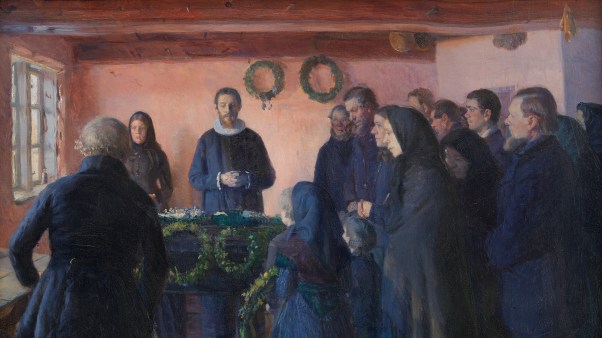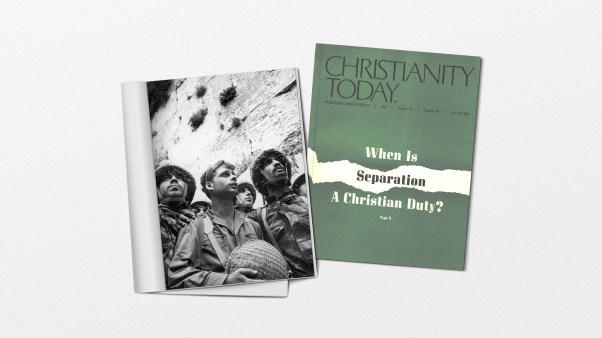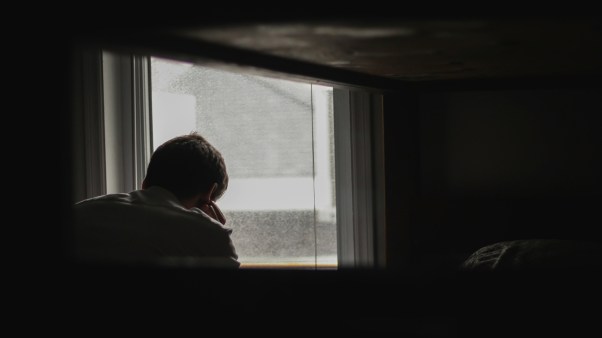Michael Cherenkov, a pastor in Washington state, has relatives on both sides of the fight between Russia and Ukraine. And as wartime propaganda makes its way into immigrant churches around him, he has spiritual family on both sides too.
Evangelical pastors in the US, leading churches where Russian Americans and Ukrainian Americans worship side by side, see the stark but quiet tensions between those who believe Russian president Vladimir Putin’s justifications for the invasion and those who are decrying the injustice of the war. Many have ties to both countries, but the war has highlighted some long-unspoken political divisions.
Cherenkov leads Revival Baptist Church in Vancouver, Washington, a 400-person, mostly Ukrainian congregation. He grew up in Ukraine, where one of his brothers is fighting and his parents are sheltering, but was born in Russia, where his sister lives.
Cherenkov’s sister—also a Baptist—supports the invasion, seeing it as a natural consequence of Ukraine siding with the European Union and the United States, and she believes that Ukraine should submit to Putin.
“It’s hard to discuss,” Cherenkov said. “It is heartbreaking for all of us.”
The tension has been more overt in Ukrainian and Russian Orthodox churches in the United States. In New York last week, the Ukrainian Orthodox Cathedral of St. Volodymyr invited Russian Orthodox leaders to a prayer service for Ukraine along with New York’s governor. The governor came, but the Russian leaders did not.
In Sacramento, California—a hub for evangelical refugees who fled the Soviet Union—an associate pastor of a Russian Baptist church opened a recent service with a call for unity as “Satan tries to divide even our community, the Slavic community, who is for Russians and who is for Ukrainians,” and decried the war, taking a political side that was unprecedented for the church.
Slavic evangelical churches in the US draw Eastern Slavic immigrants from Russia, Ukraine, and fellow former Soviet countries from the region. The communities have united around a shared background of escaping Soviet repression and having families that crisscross national boundaries. The 2014 Russian-backed conflicts in eastern Ukraine brought some political differences to the surface in American Slavic congregations, but church leaders rarely addressed it publicly.
Even with both Russians and Ukrainians in Cherenkov’s congregation, church leaders at Revival have been praying for and supporting Ukraine without any overt division. Some Slavic churches in his region, he said, have had open arguments, with Russian Americans blaming the invasion on Ukraine’s alignment with the West—a stance he attributes to the influence of Russian media.
“We have to be strong and honest. We have to name all the things as they are,” Cherenkov said. “At the same time, I have to be merciful to those who are weak and sick and brainwashed. … I just have pity. It is so sad that we as Christians are so vulnerable to the state propaganda machine—here in the US in the time of Trump and in Russia now in the time of Putin. It is so sad that we trust those politicians like false messiahs instead of the gospel of Jesus Christ.”
Since the February invasion, Russian state media like Channel One Russia and RT America have lost platforms in the US—YouTube blocked RT America’s livestream—but remain available through other streaming platforms.
RT America is in favor of the invasion, describing Ukrainians as people with “European values” and alleging Ukrainian crimes against civilians in contested Ukrainian regions like Donbas. One banner headline on its broadcast read: “Russia Accuses Ukrainian Forces of Targeting Chernobyl Infrastructure.” Sputnik News, a state-sponsored radio outlet, had a headline: “The American History of Meddling with Neo Nazis in Ukraine.”
Congregants listen to state media
Other Ukrainian and Russian pastors in the United States shared similar stories and concerns over the influence of propaganda.
“It is really sad for me, especially for the Christian people, people who are supposed to know the truth,” said Paul Demyanik, a pastor who leads the Western Ukrainian Baptist Convention in the US.
Demyanik understands why Russian evangelicals have to censor themselves under Putin. The head of the Russian Union of Evangelical Christians-Baptist in Russia, Peter Mitskevich, for example signed onto a Baptist World Alliance statement that avoided the word “war” and didn’t assign blame, because pastors in Russia risk arrest for speaking out.
“But here in the United States … they are supposed to be not afraid because the American government will not do anything against them,” Demyanik said. “Some Russian leaders are still quiet. … Many of them went through the Soviet experience. Many of them or their parents went through the persecution and prison. I cannot understand it.”
The head of the Pacific Coast Slavic Baptist Association, pastor Ivan Mileyev, said if Russians support the war, they “are very quiet.” He thinks those who listen to Russian propaganda are a small minority.
“We have some believers who do not 100 percent understand English. They sometimes listen to Russian news, so they catch up with some junk—they became victims to the propaganda,” Mileyev said. His father is Russian, and his mother Ukrainian, but he has spoken against the war.
Pew Research Center, Nielsen, and other media experts could not offer data on Russian American consumption of Russian state media. But researcher Anton Shirikov said Russian immigrants, especially those who came as adults, watch state media because it is familiar, it is in Russian, and it’s more interesting to them than US politics.
Shirikov, who used to work as an independent journalist in his native Russia, is now working on his PhD on Russian propaganda and censorship at the University of Wisconsin. Even with independent media prior to the recent crackdowns around the war, Russians still chose to listen to state outlets.
“It’s the same logic that drives media choices here and there,” said Shirikov in an email. “People like to read/watch something that portrays their home country nicely … at the same time, those who support the war may not be even watching TV—but they still get the picture from their friends or in the church.”
Russian Americans try to fight tensions
The war was the first topic at a March 6 service of the Russian Church of Evangelical Christian-Baptists, in Sacramento, also called Bryte Church, nicknamed for the Slavic neighborhood.
“We are praying God will stop this war,” associate pastor Igor Dronov told the 2,000-person congregation. “We need this peace as well….May we be united through this service and through these signs that show us the blood that was shed from Jesus Christ’s wounds and his death. Jesus’s body was broken. May we be restored in our unity.”
Senior pastor Mikhail Avramenko said this war was the first time the church had commented on political events. They have always been cautious to avoid unnecessary tensions because many Russians in Russia watch their services online. But the day after Russia invaded Ukraine, the church leaders stated that they strongly supported the freedom of Ukraine.
“We try to calculate our words,” said Avramenko. “But when the invasion happens and we see atrocities, we say it is an invasion. We are against it.”
Older Russian Baptists have a history of pacifism, according to several Russian immigrant pastors who themselves risked arrest for refusing to take up arms under mandatory military service in the Soviet Union. They tend to avoid discussing politics from the pulpit, and to focus on preaching the gospel.
Andrey Chumakin, the president of the Northwest Association of Slavic Baptist Churches and the pastor of Salvation Baptist Church in Edgewood, Washington, was one of those pacifist pastors and immigrated to the US from Russia 20 years ago. He said Russian Baptists would “not touch political topics on any occasion.” Mileyev, the head of the Pacific Coast Slavic Baptist Association, confirmed that tendency.
“For me as a leader it’s important to send a clear message. Other leaders, they don’t want to take a side in this situation, [saying], ‘We are Christian and we are not really in politics,’” said Mileyev. “They are trying to insulate themselves from reality … because they have some people in their churches who are more pro-Russia. They are trying to please everybody and not spark some fight. I think it’s not right in this time of war, when innocent people are dying, to say, ‘It’s not my business.’”
Plenty of Russian American evangelical leaders have spoken against the war and organized donations and aid for Ukraine. Bryte Church has already sent $20,000 in humanitarian aid through a Christian relief agency in Germany, along with doing regular prayer and fasting for Ukraine. But the pastors across the US are still navigating new tensions in congregations and have urged parishioners to be mindful in their social media posts.
“Any person who can cause murky waters or division—I am almost crying from the pulpit, ‘Please do not be that man who hurts others with words. Before you say anything, pray. Think,’” said Bryte’s Avramenko. “We talk about this openly in the church.”












